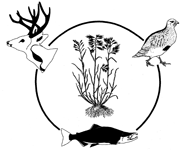Extension Wildlife & Fisheries Specialists Conferences

Triennial National Wildlife and Fisheries Extension Specialists Conference: 8th (1996)
Date of this Version
June 1996
Document Type
Article
Abstract
In the past 10 years, many natural resource agencies and conservation organizations have been involved in wetland restoration. In Iowa alone, between the Wetland Reserve Program (WRP), the Emergency WRP (EWRP), and the Private Lands Program of U.S. Fish and Wildlife Service, over 60,000 acres of palustrine and riparian wetlands have been restored, mostly on private land. This has dramatically reversed 150 years of decline in wetland acres. Other states have similar stories. What motivates landowners to participate in such programs? We undertook an 18-state survey to try to answer the question.
A phone survey of 305 participants in these wetland restoration programs revealed that wildlife play an extremely important role in landowner decisions to restore wetlands. Eighty-four percent of the participants listed "to provide habitat for wildlife" as being "extremely important" in their restoration decision. In fact, the top four reasons were all altruistic in nature, having to do with wildlife, natural beauty, and future generations. Conversely, only 10% listed "financially profitable" as an "extremely important" influence on their decision.
Other results of the survey revealed that, while all these landowners reside in rural areas, few are full-time farmers. Sixty-three percent of the surveyed landowners receive from 0-20% of their income from farming. This has implications both for how we promote such programs and how we promulgate and apply rules for participating in them.
As in other recent research, the survey also revealed that these landowners fished, hunted, had "wild places," and participated in other outdoor activities at very high rates as young people. Over 70% participated in such activities as young people, rates much higher than the general populace.
Implications of these and other results for Extension programs will be discussed.


Comments
Published in W. Daniel Edge, ed. Proceedings of the 8th National Extension Wildlife and Fisheries Specialists Workshop: Educational Challenges for the 21st Century. [1996] Corvallis, Oregon: Oregon State University, 1998.